"Body and Health Cooperation, Smart Internet" 2024 Sports health and health integration exchange activity Documentary 1: The grand opening of the event
On the morning of November 23, the Sports Health Branch of the Chinese Geriatric Society and Hangzhou Sports Bureau co-sponsored, the International Exchange Working Committee of the Chinese Geriatric Society, the First Affiliated Hospital of Zhejiang University Medical School, Hangzhou Chenjinglun Sports School co-hosted the "Physical Health Cooperation, The "Smart Internet" 2024 Sports, health and Health integration exchange event was grandly opened in Hangzhou, a famous historical and cultural city.
Professor Fan Li, President of the Chinese Geriatric Society; Professor Zhang Qiujian, Honorary Director of the Expert Committee of the Chinese Geriatric Society; Professor Chen Zheng, Vice President of the Chinese Geriatric Society; Deng Weimin, member of the Party Group and second Inspector of the Sports Bureau of Hangzhou, Zhejiang Province; Xue Liang, Director of the National Fitness Research Center of the Zhejiang Institute of Sports Science; Professor Dong Bilong, President of the Sports Health Branch of the Chinese Geriatric Society, Director of the National Clinical Medical Research Center for Geriatric Diseases (West China), Professor Wei Guoqing, Vice president of the First Affiliated Hospital of Zhejiang University, Professor Luo Weifeng, Secretary of the General Party Branch of Hangzhou Chen Jinglun Physical Education School, Professor Wang Hongman, Director of the Institute of Social and Health Research of Southeast University, Professor Hu Yixin, Director of the International Exchange Working Committee of the Chinese Geriatric Society, Professor Yang Yunmei, Honorary President of the Sports Health Branch of the Chinese Geriatric Society, Vice President of the Branch: Professor Yu Jiakuo, President of Tsinghua University; Professor MAO Jimin, Secretary of the Party Committee of Liaoning Jinqiu Hospital (Liaoning Geriatric Hospital); Professor Huang Guozhi, Professor Huang Guozhi, Southern Medical University; Professor Zhang Qin, Deputy Director of the Geriatrics Department of the First Affiliated Hospital of Zhejiang University of Medicine; Professor Ni Guoxin, Dean of the School of Sports Medicine and Rehabilitation, Beijing Sport University; Professor Wang Lin, Deputy Director of the Graduate School of Shanghai University of Sport Wait to attend the event. Xu Xiaodong, Vice president and secretary-general of the Chinese Geriatric Society, and Sun Ning, director of the Medical Center of Hangzhou Chenjinglun Physical Education School, presided over the opening ceremony.

Guest speech
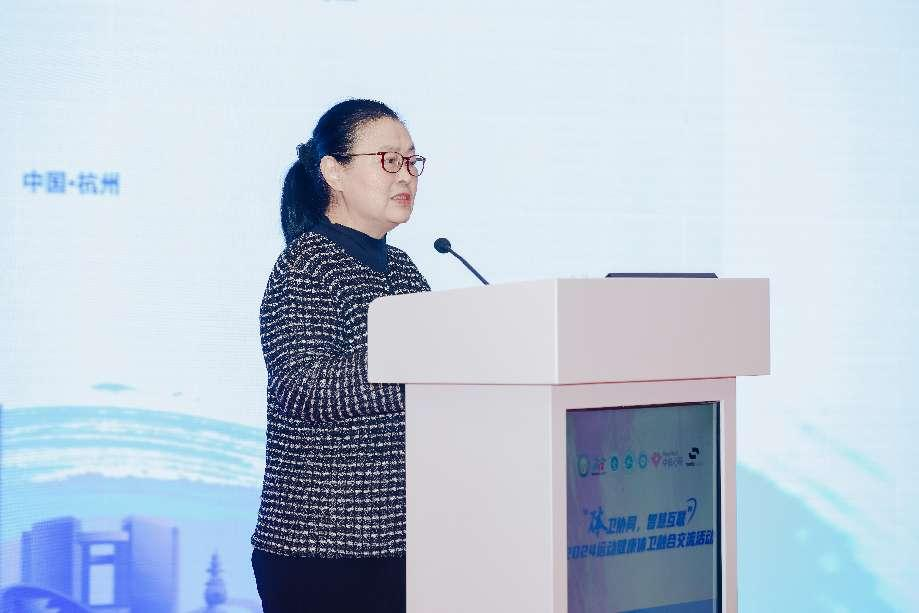
Professor Zhang Qiujian, honorary director of the Expert Committee of the Chinese Geriatric Society, expressed warm congratulations on the smooth convening of the conference. She affirmed the three achievements of the Sports Health Branch in the past year: first, it has gathered more than 600 members, carried out many academic, science popularization, free clinic and other activities, and won the strength of Hangzhou Sports Bureau; Second, cross-border activities were organized in various fields, including cross-border, integration and crossover activities. Thirdly, a series of personnel training work has been carried out for inheritance. Second, we should continue the joint working mode, carry forward the advantages of all walks of life, and explore the appropriate institutional framework; Third, we should strengthen the development and application of new technologies. Zhang Qiujian stressed that through these efforts, the Sports Health Branch will better serve the society, promote the in-depth development of physical and health integration, and contribute to the realization of the goal of national health. She called on participants to join hands and work together to build a healthy China.
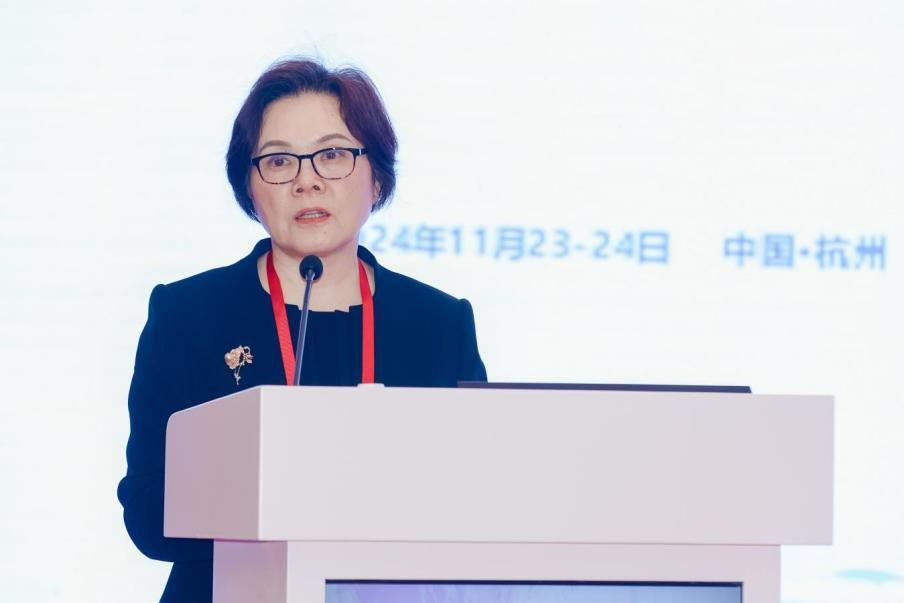
Professor Dong Bilong, President of the Sports Health Branch of the Chinese Geriatric Society, welcomed the arrival of experts and representatives from all walks of life. She said that this activity closely follows the distinct theme of "physical and health cooperation, smart interconnection", deeply focusing on sports injury and rehabilitation, wearable devices, artificial intelligence and elderly sports, elderly sports prescription and active health and other frontier fields, bringing everyone a rich knowledge feast and practical guidance; It emphasizes the strategic significance and value of physical and health integration in a healthy China and a sports power, highlights the advantages of multi-efficiency and low cost of physical exercise in disease prevention, and stimulates the public's active awareness and enthusiasm to actively participate in scientific fitness.
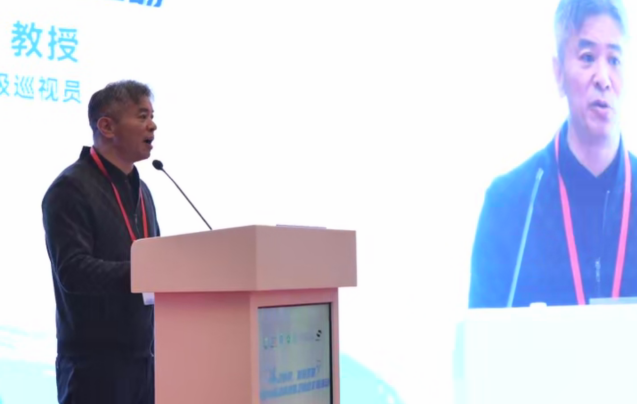
Deng Weimin, a member of the Party group and second-level inspector of the Sports Bureau of Hangzhou, Zhejiang Province, from the reflection of the current national health situation, put forward that how to effectively implement the integration of sports and health is a major issue in front of the government. From the top-level design of policies to the optimal allocation of resources, it is necessary to establish a linkage mechanism between sports and medical care to realize resource sharing and complementary advantages. In addition, we should pay attention to the training of sports and medical talents, especially the compound talents who know both sports and medical care. In the further practice, we should strengthen the publicity and guidance to improve the public's understanding of body-health integration; Through media publicity, public welfare activities and other ways, popularize physical exercise and health knowledge, enhance public health awareness, and guide the public to actively participate in the practice of health integration. In short, we should actively promote the cooperation of all sectors of society, form a joint force, jointly promote the development of health integration, improve the national health level, and build a healthy China.
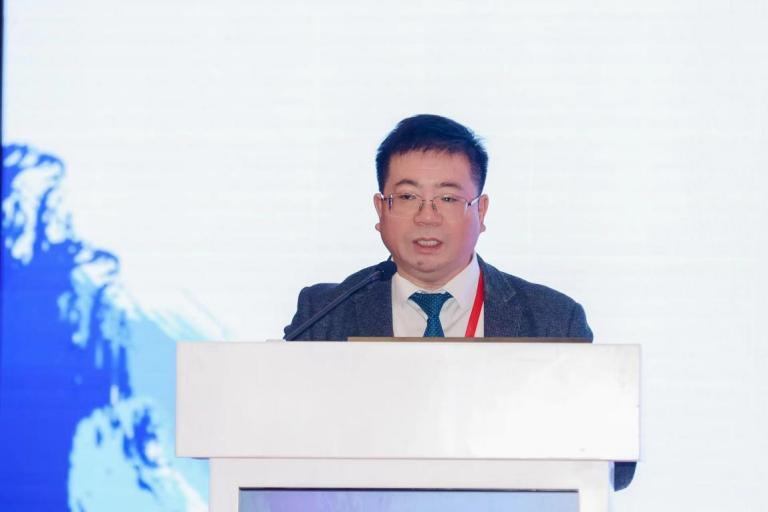
Professor Wei Guoqing, vice president of the First Affiliated Hospital of Zhejiang University, pointed out that with the implementation of the 2030 Healthy China Plan, hot issues such as health integration, smart medical care, and active health have gradually become the focus of attention from all walks of life. How to effectively promote and realize the organic combination of medical treatment and sports, promote the progress of precision medicine and personalized medicine, and how to use modern information and intelligent devices to improve our health service level is the challenge we face. We hope that through this activity, we can promote the in-depth exchanges and cooperation among experts from all walks of life, further improve our health services, stimulate the attention and support of all walks of life for the health of the elderly, promote the popularization of health knowledge, help more people master the exercise method suitable for themselves, and realize the health management of the whole life cycle. Facing the future, we will continue to uphold the concept of health integration and smart interconnection, continue to explore innovation, deepen cooperation, jointly cope with the challenges brought by aging, and strive to create a healthier and happier social environment for the elderly.
"Osteoarthritis Health Management Professional Training Manual" book launch
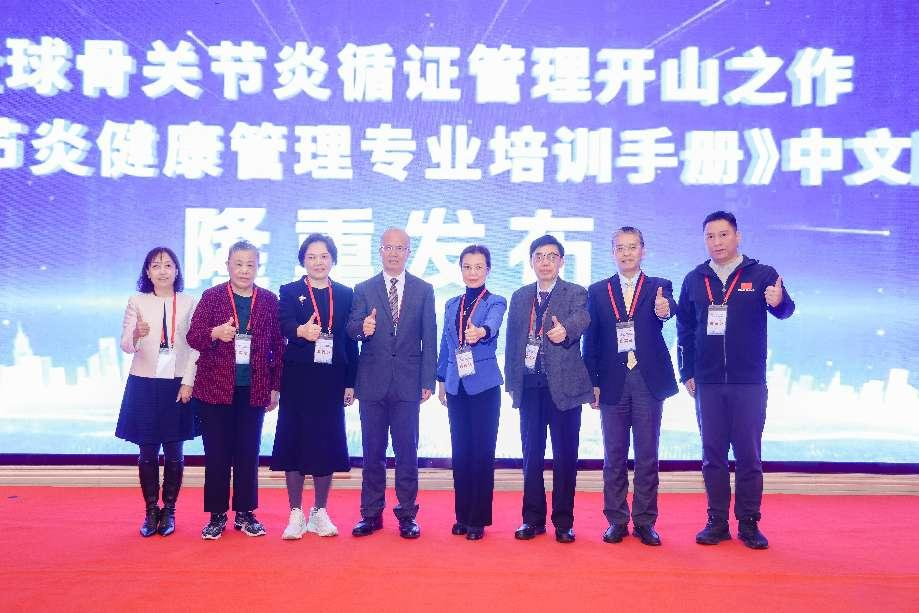
The book launch of "Professional Training Manual for Osteoarthritis Health Management" was held after the guest speech. The book was translated by Professor Ni Guoxin, dean of the School of Sports Medicine and Rehabilitation of Beijing Sport University. The original version of the book is the first work of global evidence-based management of osteoarthritis. Aiming at the shortcomings of current health care of osteoarthritis, it provides the best evidence to practice "people-oriented" care, which is time-effective, authoritative, scientific and systematic. Experts at the meeting expressed high recognition for the publication of the new book, believing that it will have a positive impact on the field of osteoarthritis health management in China.
Academic keynote speech
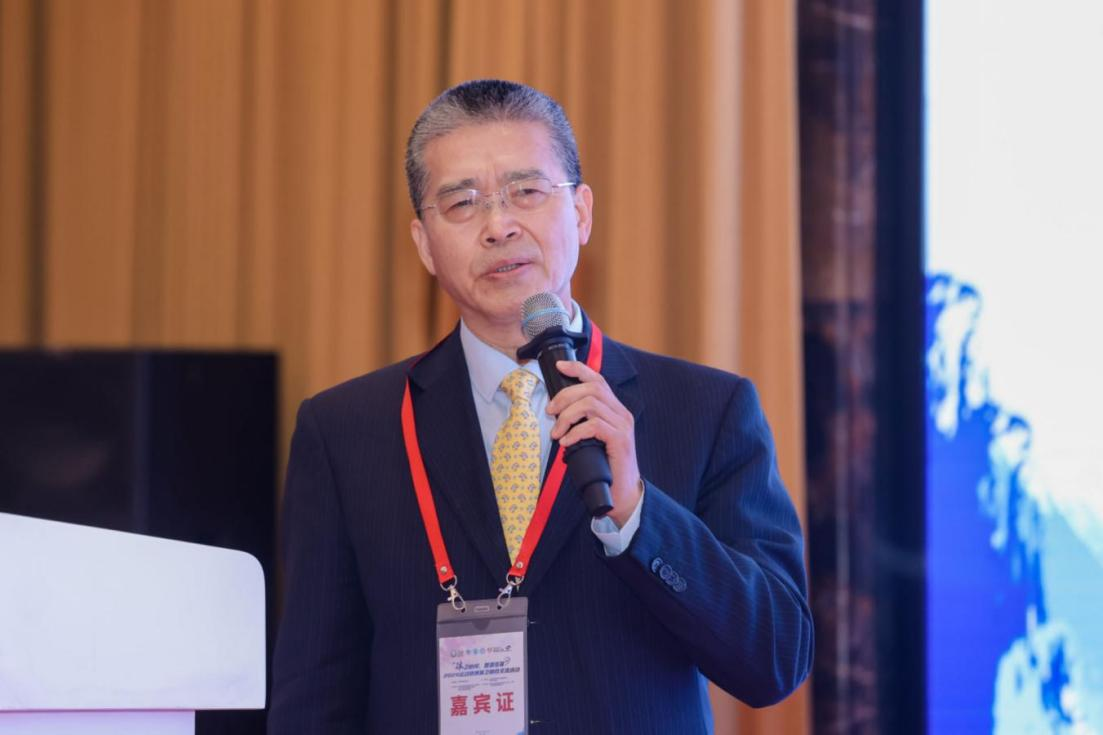
The following keynote speech session was hosted by Professor Yunmei Yang and Professor Bilong Dong. First of all, Professor Yu Jiakuo gave an academic speech on "Solving the pain points in the needs of physical and health integration - Promoting the transformation and wisdom upgrading of the diagnosis and treatment results of knee joint sports injuries", which explained the current problems in the diagnosis and treatment of knee joint sports injuries in a simple way and put forward innovative solutions.
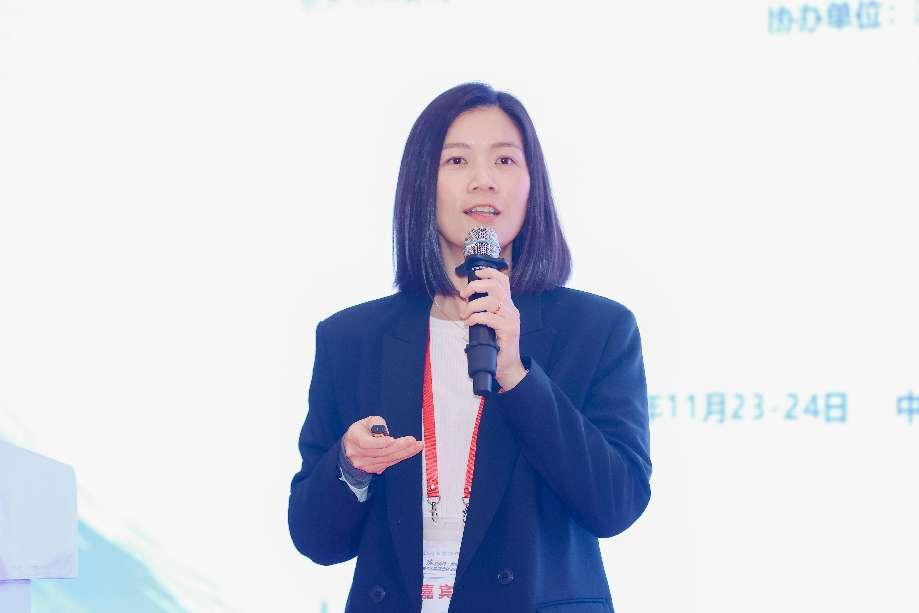
Professor LEong Ka-man's wonderful sharing of "Elderly Physical Activity Research into social Impact", through detailed data and cases, shows how to translate the findings of elderly physical activity research into social policies and practices, so as to improve the quality of life and social participation of the elderly.
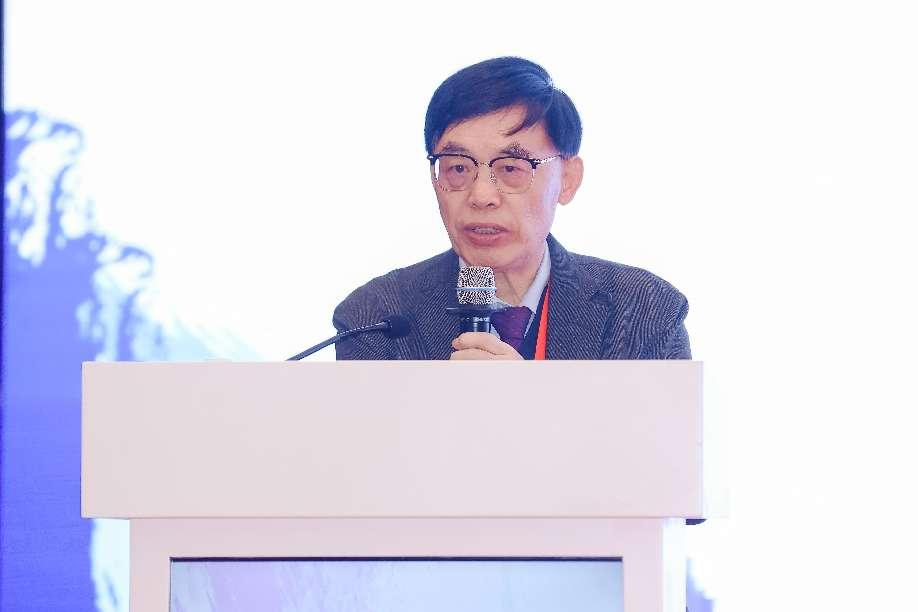
Academician Zhang Yuanting showed us the innovative development strategy of "from smart wearable technology to active health management". Starting from the third revolution of "for human health", it Outlines the process of medical and industrial integration from disciplines to technologies, from applications to industries, describes the prospect of data-driven medical decision-making, and the future medical model of "8-P" health.
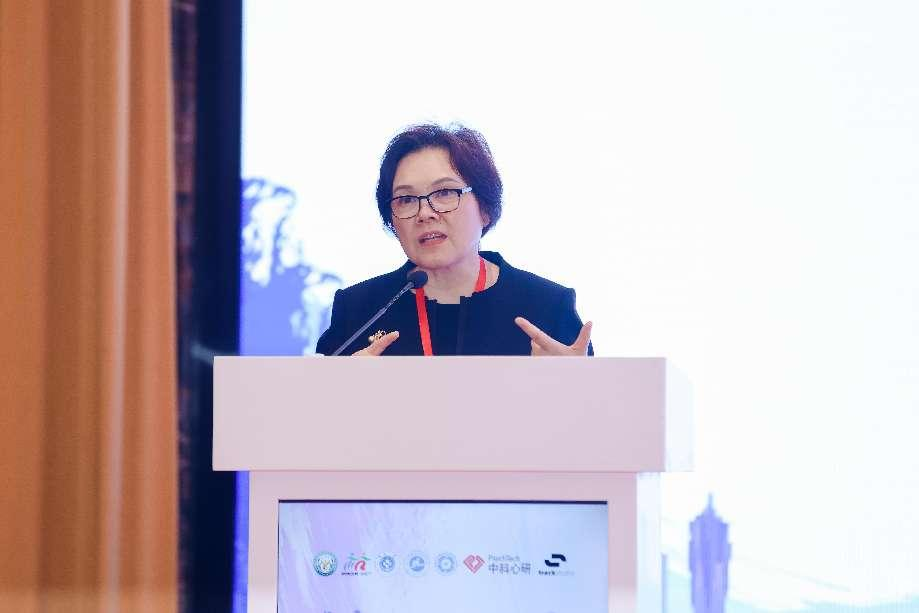
From the aspects of physiology, psychology and other aspects, Professor Dong Bilong gave us a detailed lecture on why "exercise is the best 'anti-aging drug'" through research data and examples, stressed the importance of regular exercise to delay aging and enhance physical function, and put forward personalized exercise prescription suggestions, which not only provided scientific basis for participants, but also provided scientific basis for participants. It also provides practical guidance for promoting healthy lifestyle and contributes valuable knowledge to the development of sports health.
Round table discussion
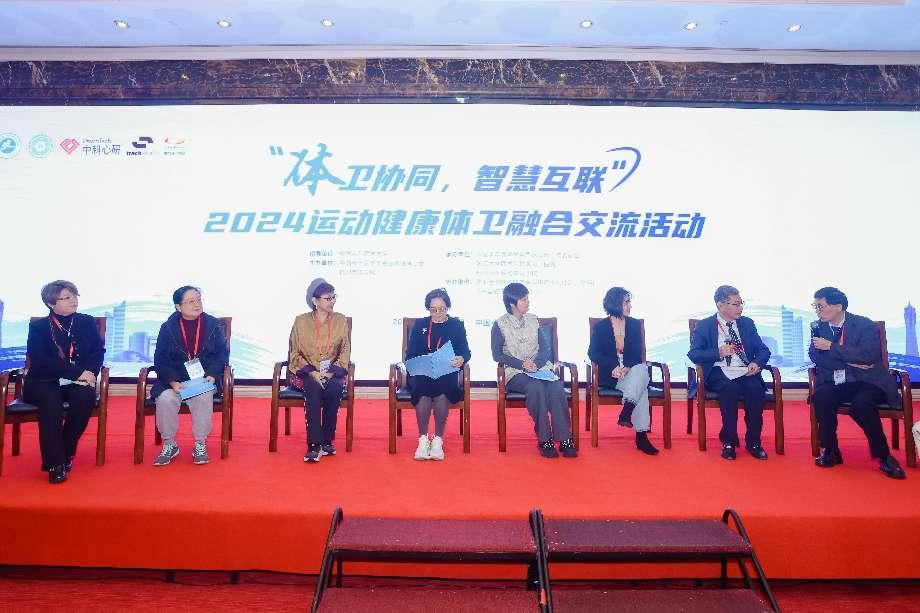
After the keynote speech, experts had a wonderful roundtable discussion on how to do a good job of active health and the pain points of elderly exercise prescription promotion. The round table discussion was moderated by Professor Zhu Jimin, Professor Cui Ying from Hangzhou Chenjinglun Sports School, Professor Wang Zhengzhen from Beijing Sport University, Jing Chao, member of the Chief Editor Office of People's Daily Health Times and Director of the Hospital Department, Hu Qingbo, Executive producer and Director of the "Life Circle" program of China Media Group, And Dong Bilong, Zhang Yuanting, Wang Hongman and other experts participated in the roundtable discussion. In the round table discussion, the experts expressed their opinions. Academician Zhang Yuanting first discussed how to do sports safely from the perspective of sports safety combined with smart wearable technology; From the perspective of health economics, Professor Wang Hongman demonstrated the input and output of active health, hoping to jointly promote the application of big data analysis and optimize exercise prescription through big data analysis; Professor Wang Zhengzhen shared her experience on personalized exercise prescription, stressed the importance of making personalized exercise plan according to the physical condition and living habits of the elderly, and proposed to strengthen quality training to implement exercise; Professor Cui Ying discussed her own understanding of the concerns of health promotion, analyzed the upgrading of exercise prescription in cooperation with medical treatment, and pointed out the existing problems in the promotion of exercise prescription for the elderly, such as the lack of targeted exercise guidance and the elderly's insufficient understanding of the importance of exercise. Jing Chao proposed that the key to promoting exercise prescription lies in the establishment of correct cognition, integration of knowledge, faith and action, that is, through education and publicity to improve public awareness of the importance of exercise, build trust, and ultimately translate into action. She suggested that sports health knowledge should be spread through multiple channels to enhance public health awareness and participation in sports. Hu Qingbo also believes that in the promotion of sports, how to change people's concept is the key. Media has its communication advantages and can play a role in guiding people to make choices and guiding the public to establish correct sports concepts in the integration of sports and health. She hopes that the academic community can more linkage with the media, through the production of high-quality health education programs and public service advertisements, and the use of social media platforms. Enhance engagement with the public to increase the coverage and impact of sports health messages; Professor Dong emphasized the importance of interdisciplinary cooperation. She pointed out that in order to realize the effective promotion of sports health prescription, the joint efforts of sports, medical, education, media and other aspects are needed. She also proposed the establishment of a comprehensive sports health information platform to promote information sharing and resource integration, so as to provide the public with more accurate and personalized sports health guidance. At the end of the discussion, the experts jointly called for strengthening communication and cooperation inside and outside the industry to jointly promote the development of sports health.
Special session

In addition to the academic keynote speech, there are six thematic sub-venues. The important role of sports health in active aging was discussed from the perspectives of wearable devices, the application of artificial intelligence in the field of aging, interdisciplinary cooperation in the aging process, sports and brain health, sports and cardiovascular health in the elderly, sports injury and rehabilitation in the elderly, sports nutrition and sarcopenia in the elderly.
On the afternoon of November 23, we first focused on wearable devices and artificial intelligence. Professor Wang Lin of Shanghai Sport University and Professor Wang Minmin of the Institute of Optoelectronics of Westlake University respectively introduced the application prospect of artificial intelligence and wearable micro signal collector in geriatric medicine around "Application of inertial measurement unit in measuring posture control of the elderly" and "Research on Wearable multi-mode physiological signal monitoring and functional regulation". Professor Yang Yunmei of the First Affiliated Hospital of Zhejiang University gave a lecture on "Application of Ultrasound technology in the diagnosis of sarcopenia", focusing on the measurement of muscle cross-sectional area by ultrasound as a supplement to the current diagnostic technology of sarcopenia, which has strong clinical application value.
In the topic of exercise and aging brain health, Professor Gao Naichun from the School of Education of Zhejiang University and postdoctoral Wang Yubu from the School of Psychology of Shenzhen University, from the perspective of combining social cognition and neurocognition, proposed to promote exercise for the elderly through enhancing pleasant emotional experience of exercise, so as to delay cognitive aging. Professor Zhu Yi from the First Affiliated Hospital of Nanjing Medical University and Professor Hu Yixin from the General Hospital of the People's Liberation Army respectively shared their experiences on "Assessment and exercise rehabilitation of cognitive function in the elderly" and "VR rehabilitation of cognitive weakness based on sarcopenia and frailty Clinic", and emphasized the important role of exercise rehabilitation in cognitive weakness. The clinical application of VR rehabilitation in China is also introduced.
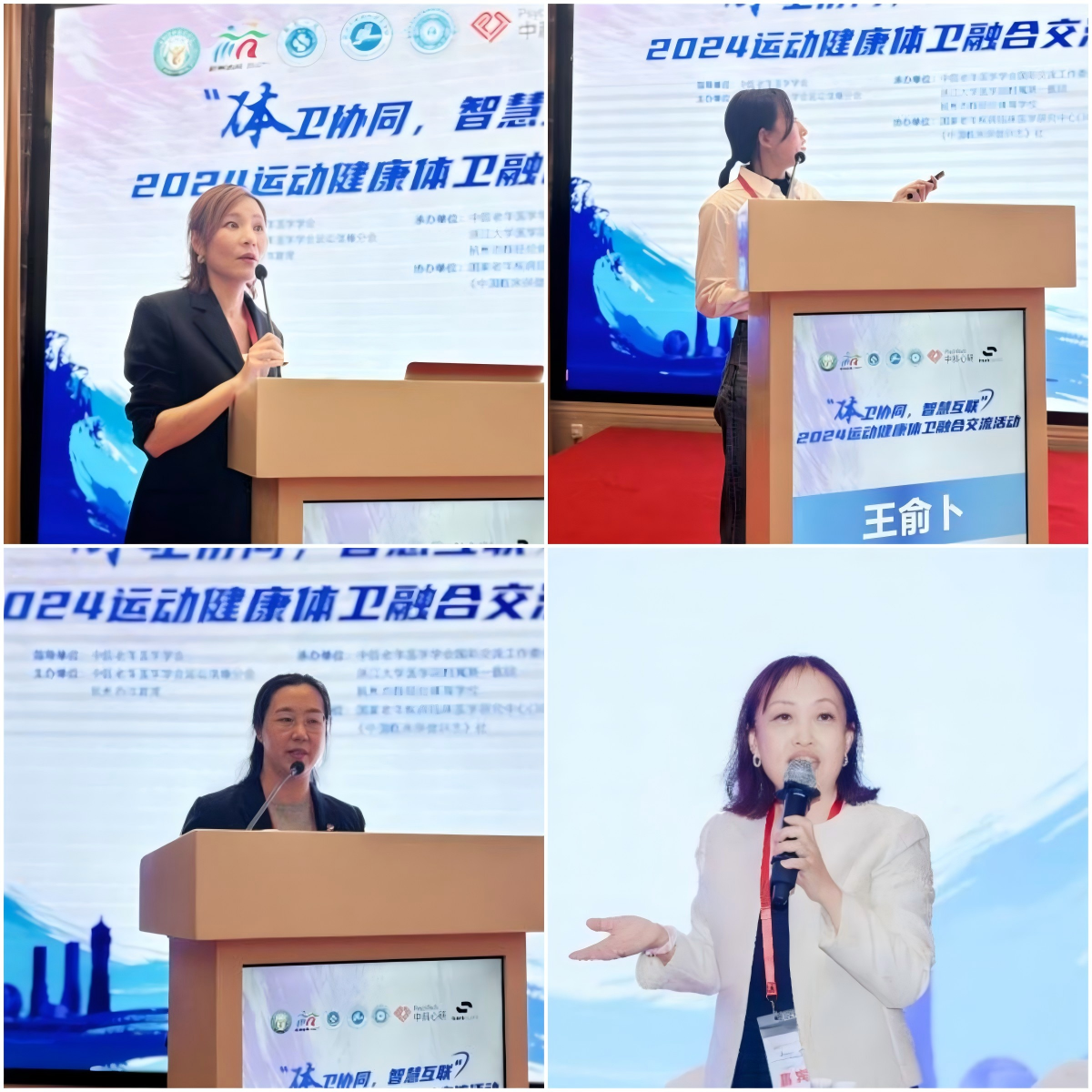
Symposium on Active aging, exercise and cardiovascular health in Old age. First of all, President Fan Li systematically sorted out the current problems in geriatric medicine -- the management status of comorbidiosis and multiple drugs in the elderly, emphasized the importance of multidisciplinary teams in geriatric medicine, and proposed to create an innovative service model of geriatric medicine that is in line with China's national conditions to actively promote healthy aging.
Academician Li Jianan conducted academic exchanges around "Jogging and bone and joint rehabilitation". As a physical exercise medicine expert, he proved that proper exercise can treat osteoarthritis through personal practice of fracture recovery, advocated that exercise can promote bone and joint health, and put forward the dialectical thought of "exercise is medicine, exercise is not good medicine". The experts and students at the meeting were deeply convinced.
Professor Kang Lin of Peking Union Medical College Hospital gave a lecture on "Promotion and integrated Care of geriatric medicine", proposed a one-stop service of geriatric medicine, and focused on the digital assessment and intervention system for sarcosis developed by Union Medical College Hospital with artificial intelligence means to realize the concept of integrated care.
In response to the topic of exercise and elderly cardiovascular health, Professor Wang Fang from the Department of Cardiovascular Medicine of Beijing Hospital gave a lecture on "Structural assessment, cardiac function Assessment and exercise pre-adaptation". From the perspective of sports cardiology, she explained the key points of differentiating physiological and pathological heart-related changes for us, so that we could have a certain understanding of the physiological adaptation and cardiovascular risk of athletes' hearts.
Professor Liu Suixin from Xiangya Hospital of Central South University focused on "the concept of active exercise rehabilitation and exercise intervention", emphasizing that active exercise rehabilitation should start from changing the sedentary lifestyle, not only pay attention to aerobic exercise capacity, but also carry out strength training at the same time, and also shared the update points of the 2024 AHA cardiac rehabilitation guidelines for everyone.
Professor Wei Wenzhe from the Beijing Institute of Sports Science introduced the research progress of endurance sports in competitive sports from the perspective of sports training, and shared with us simple and effective exercise methods suitable for elderly endurance training.
Finally, Professor Xu Yong of PLA General Hospital and Professor Xu Shunlin of Peking University Third Hospital respectively exchanged questions about exercise for cardiovascular patients around "encouraging and motivating coronary heart disease patients to participate in exercise" and "physical exercise promotion and clinical exercise health care". After a morning of academic activities, the participants gained a lot and had a profound understanding of the important role of exercise rehabilitation in healthy aging and chronic disease management.
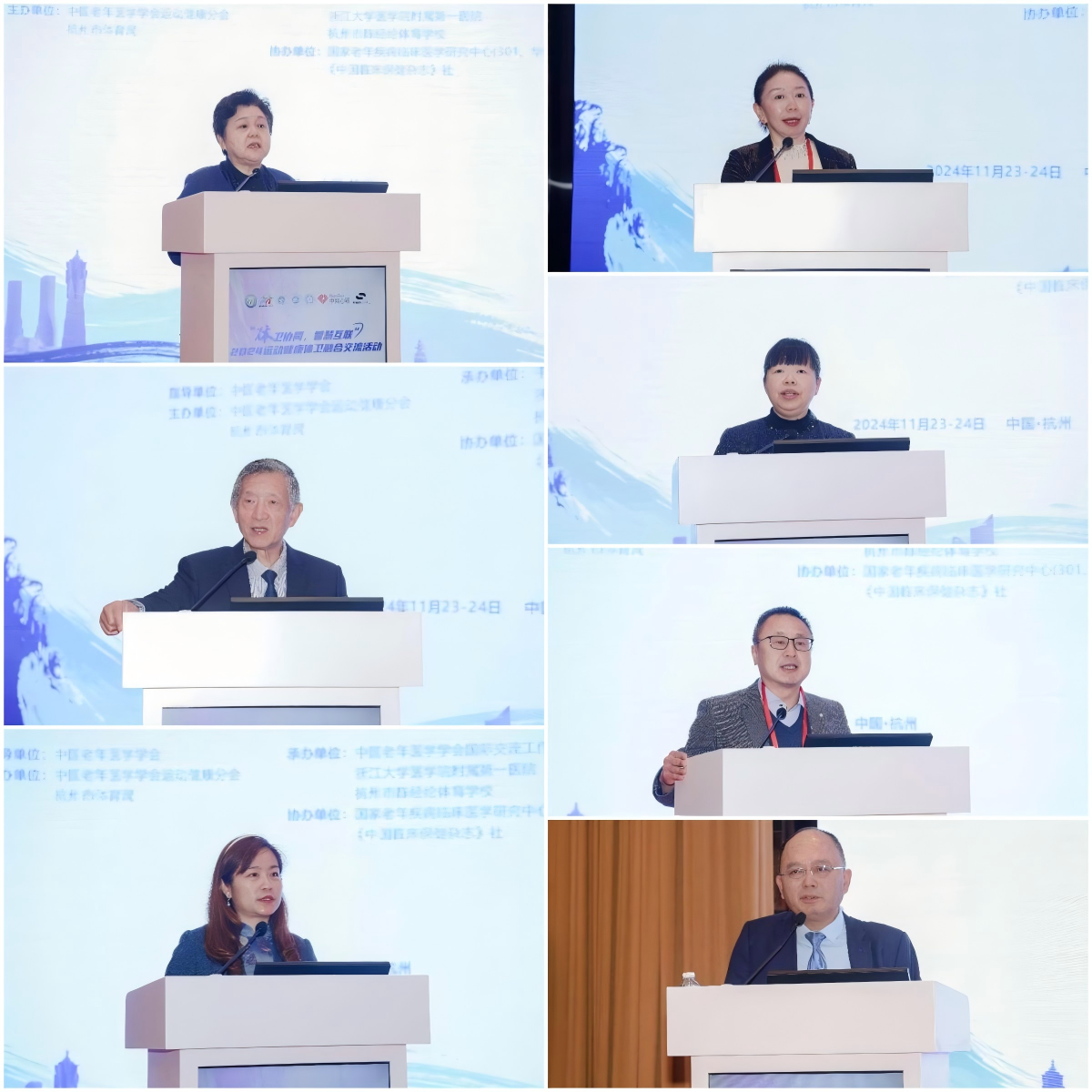
On the afternoon of October 24, the special session focused on sports injury rehabilitation, nutrition, and sarcopenia. First of all, Professor Huang Guozhi presided over the elderly sports injury and rehabilitation forum. Muscles are not only the source of strength, but also the guarantee of joint stability, and the muscle strength and joint flexibility of the elderly gradually decline, making them more susceptible to sports injuries when participating in sports activities. From the perspective of "muscle" life, Professor Xue Liang explained the value of elderly muscles to reduce the risk of sports injury and introduced the methods of strengthening muscle strength. In terms of sports injury rehabilitation, Professor Ni Guoxin has brought new considerations, and adopting correct scientific methods can promote rapid and effective rehabilitation of the elderly. Because of its fun and social nature, the net against ball game is favored by many elderly people. However, this kind of sport requires high flexibility and reaction speed of the body. Professor Sun Ning gave us a lot of new suggestions on what protection the elderly should pay special attention to when participating in sports and how to effectively prevent sports injuries while enjoying the fun of sports. Professor Huang Guozhi showed us the great potential of AI technology in the rehabilitation of knee joint sports injuries. Combining AI technology with traditional rehabilitation methods, virtual reality technology conducted simulation training to improve the interest and effect of rehabilitation training and provide more comprehensive rehabilitation services for the elderly.
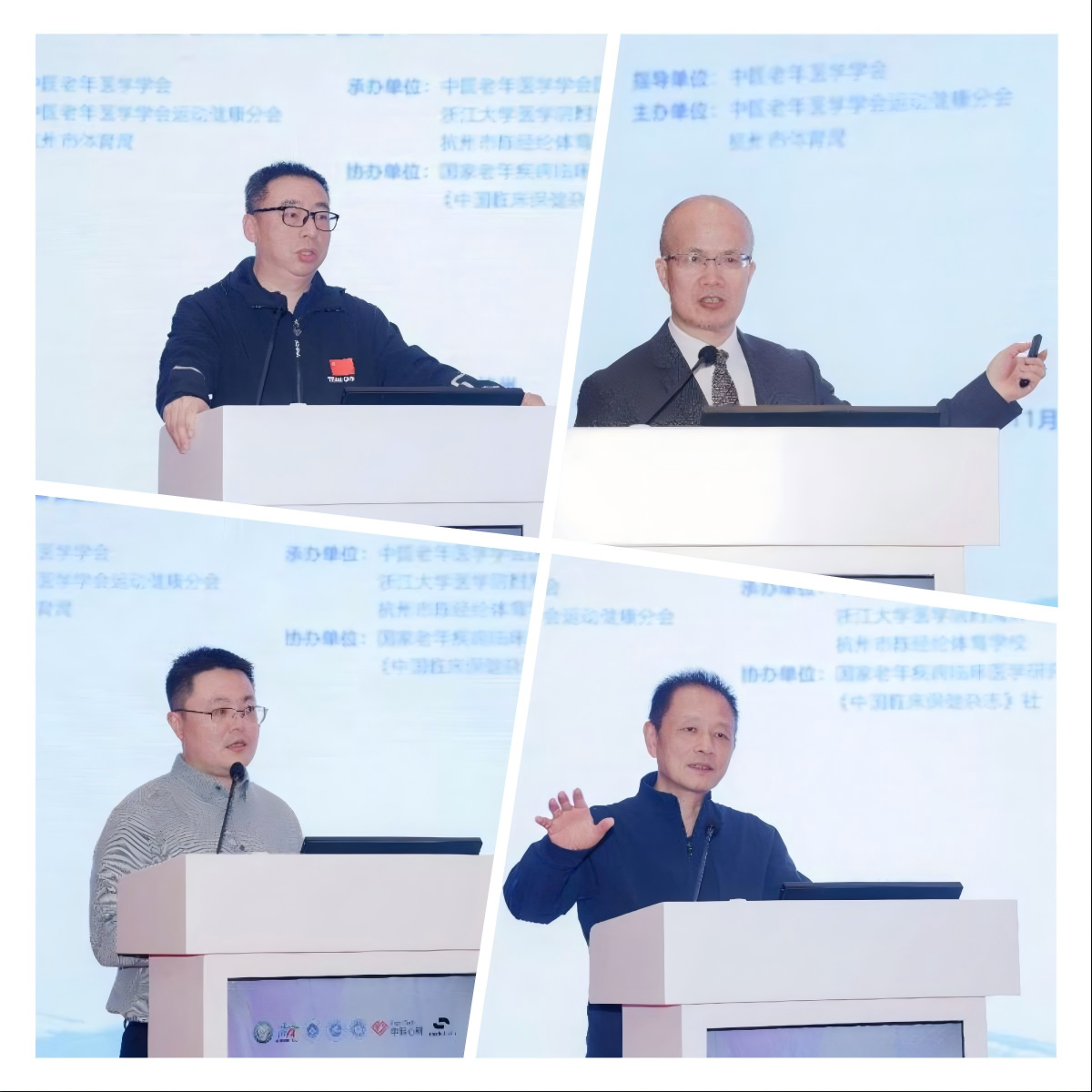
Next will be a panel session on exercise, nutrition and sarcopenia - frailty in old age co-chaired by Professors Qin Zhang and Yixin Hu. First, Professor Zhang Li guided everyone to explore the positive impact of exercise and nutrition on the elderly. With the increasing aging of the world, the research on the intrinsic ability of the elderly has become a high-profile topic, and Professor Ouyang Xiaojun has conducted an in-depth analysis of the latest progress in this field. In view of the widespread concern about sarcopenia in the elderly, Professor Zhang Qin provided us with a detailed explanation from the perspective of nutritional support, and stressed that nutritional support is not an independent existence, it needs to be combined with exercise, primary disease treatment and necessary drug therapy to form a comprehensive and comprehensive treatment program. Finally, Professor Wu Xiaochu showed us the broad application prospect of interdisciplinary cooperation in the study of health management of the elderly population from the perspective of the combination of medicine and industry.
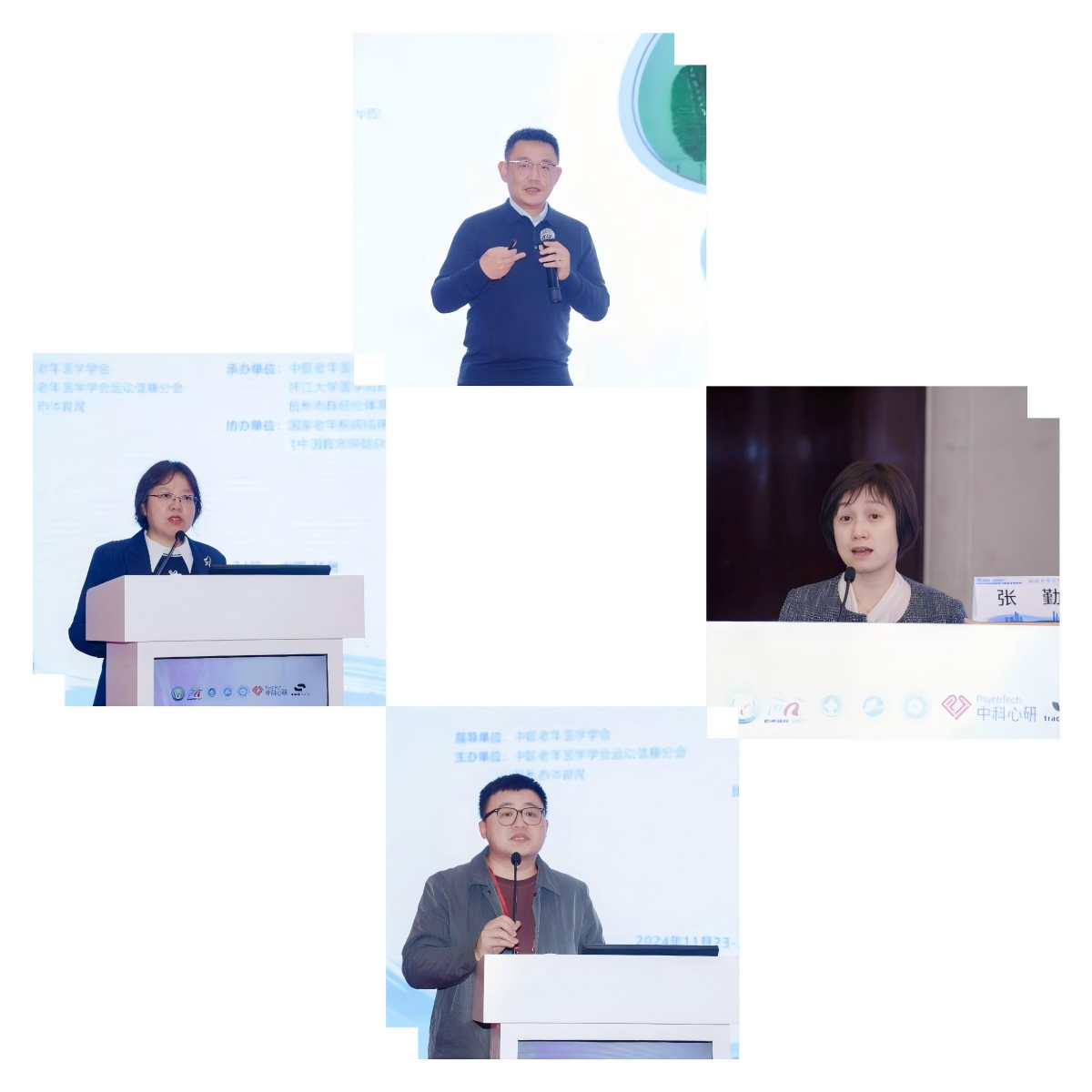
The meeting was very exciting and the participants benefited a lot. It not only has a deeper understanding of the current research in the field of geriatric health, but also has a new understanding of how to combine theory with practice to improve the quality of life of the elderly. The cases and research results shared by the experts provide valuable references for future research directions and policy formulation. In addition, through exchanges and discussions, the intention to cooperate among the participants was strengthened, laying a good foundation for subsequent interdisciplinary cooperation.

